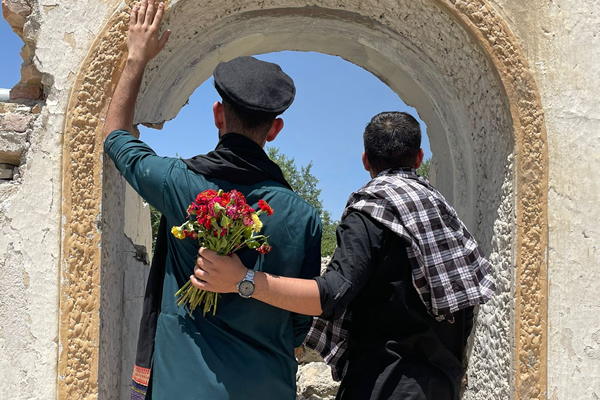Advocacy groups urge Biden to develop plan to protect LGBTQ Afghans
A group of six advocacy groups on Thursday urged the Biden administration to develop a 10-point plan to protect LGBTQ Afghans after the Taliban regained control of their country.
The Council for Global Equality; the Human Rights Campaign; Immigration Equality; the International Refugee Assistance Project; the Organization for Refuge, Asylum and Migration and Rainbow Railroad in a letter they sent to President Biden called for his administration to “prioritize the evacuation and resettlement of vulnerable refugee populations, including LGBTQI people, and ensure that any transitory stay in a third country is indeed temporary by expediting refugee processing.”
The nine other suggestions are below:
– Provide and effectively implement explicit “Priority 2” (P-2) access to the U.S. refugee program for the highly vulnerable population of LGBTQI individuals fleeing Afghanistan. Waive the application fee for any LGBTQI Afghan applying to relocate to the United States on an expedited basis via humanitarian parole and look favorably upon those emergency requests. Initiate a new program of Temporary Protected Status (TPS) for Afghans in the United States, including those paroled into the United States on an emergency basis.”
– Ensure that existing lists that have been collected by various governments of at-risk Afghans, including those who wish to flee because of their sexual orientation or gender identity, are carefully safeguarded so that they do not fall into Taliban or third-country hands and are not used to target individuals or family members. Use the lists as a basis for expedited P1 or P2 refugee processing or humanitarian parole for those who seek protection abroad.”
– Lift or expand the FY (fiscal year) 2022 refugee cap of 125,000 refugees accepted into the United States.
– Provide funding to support the temporary housing, livelihoods and security of LGBTQI refugees in third countries while they are being processed for refugee resettlement in the United States or elsewhere.
– Recognize NGOs that have been reliable partners in identifying and recommending LGBTQI Afghans to the State Department for protection and instruct U.S. embassies to process LGBTQI refugee applications on site when referred by these designated partners.
– Recognize for the purposes of refugee relocation, humanitarian parole or any other entry into the United States any same-sex Afghan partner as a spouse. Take an equally expansive view of the definition of family for LGBTQI relocation given the lack of legal recognition for LGBTQI partnerships in the region.
– Expand LGBTQI-sensitive resettlement programs in the United States and engage with NGOs and local communities to expand the U.S. capacity to absorb larger numbers of LGBTQI Afghan refugees in supportive and inclusive environments, including through new refugee sponsorship programs.
– Speak out forcefully against human rights abuses by the new Taliban regime and any increased targeting of vulnerable communities, including LGBTQI people, and use existing mechanisms to sanction and hold accountable perpetrators of human rights abuse. Negotiate explicit human rights monitoring access, with a particular focus on vulnerable communities including LGBTQI Afghans, when the mandate of the U.N. Assistance Mission in Afghanistan is renewed by the Security Council later this month.

The Taliban entered Kabul on Aug. 15 and toppled then-President Ashraf Ghani’s government.
A Taliban judge in July said the group would once again execute people if it were to return to power in Afghanistan. A gay Afghan person with whom the Washington Blade spoke earlier this week said they and their family fled their Kabul home because of the Taliban.
“I’m scared,” they said. “I can’t go outside … everything has totally changed.”
The groups in their letter to Biden said the Taliban “takeover of Afghanistan has focused international attention on the safety and livelihood of many vulnerable populations, including women and girls, and lesbian, gay, bisexual, transgender, queer, and intersex (LGBTQI) Afghans.”
“As the decision to withdraw from Afghanistan will be part of your legacy, so too will be the actions your Administration takes to ensure the well-being of these populations,” reads the letter.
The letter also notes the groups “are deeply disappointed that your administration did not press to extend the Aug. 31 deadline to evacuate more at-risk refugees from Kabul, but we are heartened by your pledge to continue to support refugee evacuation and resettlement in the coming weeks.”
“The United States bears a special responsibility not to abandon those we have encouraged along the path to democracy and human rights, and to act expeditiously to ensure their safety,” it says.
Canada is thus far the only country that has specifically said it would offer refuge to LGBTQ Afghans. Immigration Equality earlier this week said it spoke “directly” with 50 LGBTQ Afghans before the U.S. completed its withdrawal from the country on Aug. 30. “
The international community must act in concert to protect vulnerable populations now placed at risk,” reads the letter to Biden. “We urge the United States to increase and prioritize its immediate, medium-term and long-term efforts on behalf of the LGBTQI community in Afghanistan using these 10 protection priorities.”